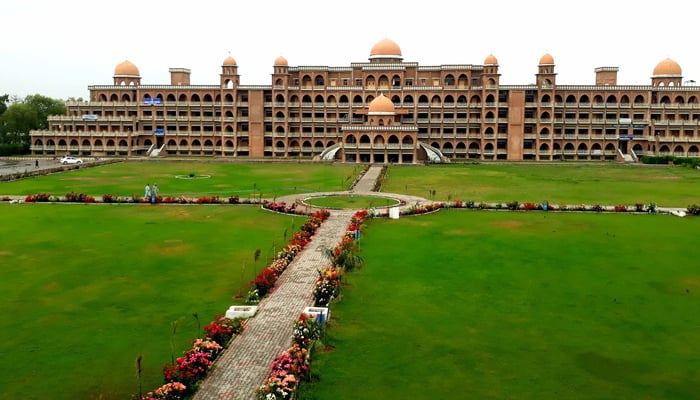UoP academics begin drive to ensure plastic-free campus
PESHAWAR: Taking steps towards creating a plastic-free campus, the academics at the University of Peshawar introduced a pioneering initiative titled ‘Green Campus Journey.’
The activity is aimed at reducing plastic and disposable waste as well as encouraging the use of reusable items in campus cafes and restaurants. The initiative, launched in collaboration with Sustainable Energy and Economic Development (SEED), was unveiled during a seminar titled “Embracing Reusable: Unveiling a Sustainable Tomorrow.”
Spearheading this initiative are experts in their respective fields, with Sociologist Dr. Zafar Khan from the Sociology Department and Dr. Shakil Ahmad of the Institute of Management Sciences (IMS) University of Peshawar.
Under the initiative, cafes within the campus will introduce reusable cups and glasses to fulfill their environmental responsibility. To support this initiative, a nominal additional charge of Rs20 will be applied when a student opts for a reusable cup with their beverage purchase.
Among the speakers were Dr. Bushra Khan of the Environmental Science Department, Dr. Habib Jan, Director of the Environmental Protection Agency, Dr. Noman Khan of University of Agriculture, Management, and Development Specialist Hashim Khan, and Taimur Khan from Sustainable Energy and Economic Development (SEED).
In a presentation, Dr. Shakil revealed that a quantitative study was conducted under the initiative by students of the Sociology Department and IMS that shows a staggering statistic: a million pieces of disposable cups are used every month in the University of Peshawar alone.
He said if other institutions within the campus are considered, such as the Agricultural University and Islamia College University, the total quantity of disposable cups used would be significantly higher.
Painting a distressing picture of escalating plastic pollution, Dr. Bushra lamented the transformation of the once serene green lawns of the university into areas littered with plastic waste. She expressed concern about microplastics infiltrating the food chain, warning that plastic waste is finding its way into waterways, agricultural lands, and, ultimately, becoming part of the food chain in the form of microscopic particles.
During a panel discussion organized as part of the seminar, Dr. Noman emphasized the severe impacts of plastic pollution, revealing that studies have identified nano-particles of plastic in the food chain that persist for up to 300 years. He underscored that plastic pollution is affecting every aspect of the environment, from the food chain to surface and groundwater resources.
Dr. Hashim argued that it is not too late to make a change and create a society free of plastic waste. He emphasized the importance of rigorous behavior change campaigns, shedding light on the sociological, psychological, physical, and mental impacts of plastic pollution on humans.
Discussing legislation and policy, Dr. Habib Jan acknowledged that the government had formulated clear and stringent laws, including a ban on non-biodegradable plastic in the province. However, he pointed out weaknesses in implementation, stating that the government still lacks control over the use of plastic.
Representing SEED, Taimur stressed the need to incorporate environmental education into the curriculum from primary to university levels, highlighting the importance of fostering a sense of responsibility towards the environment from an early age.
-
 Kanye West's Best Songs: Fans Argue Over Bold Top 10 Ranking On Social Media
Kanye West's Best Songs: Fans Argue Over Bold Top 10 Ranking On Social Media -
 King Charles Secretly Relies On Advice From THIS Royal
King Charles Secretly Relies On Advice From THIS Royal -
 Jennifer Garner Reveals Beauty Choice She Makes As Botox Alternative In Her 50s
Jennifer Garner Reveals Beauty Choice She Makes As Botox Alternative In Her 50s -
 Kate Middleton Drops Four-word Message For Young Girl After Wales Visit
Kate Middleton Drops Four-word Message For Young Girl After Wales Visit -
 Shamed Andrew Uncensored ‘massages’ Should Be Refunded To Public
Shamed Andrew Uncensored ‘massages’ Should Be Refunded To Public -
 Kylie Kelce Reveals Rules She Wants Daughter Bennett To Learn At 3: No More 'passies'
Kylie Kelce Reveals Rules She Wants Daughter Bennett To Learn At 3: No More 'passies' -
 Smartphone Market Set For Biggest-ever Decline In 2026
Smartphone Market Set For Biggest-ever Decline In 2026 -
 Mud, Rain, Loincloths: All About Japan’s 200-year-old Harvest Wrestling Ritual
Mud, Rain, Loincloths: All About Japan’s 200-year-old Harvest Wrestling Ritual -
 Jonathan Majors Set To Make Explosive Comeback To Acting After 2023 Conviction
Jonathan Majors Set To Make Explosive Comeback To Acting After 2023 Conviction -
 Next James Bond: Why Jacob Elordi May Never Get 007 Role?
Next James Bond: Why Jacob Elordi May Never Get 007 Role? -
 Maddox Drops Pitt From Surname In Credits Of Angelina Jolie’s New Film 'Couture' Despite Truce From Father's End In Legal Battle
Maddox Drops Pitt From Surname In Credits Of Angelina Jolie’s New Film 'Couture' Despite Truce From Father's End In Legal Battle -
 Meghan Markle Adds Diamonds To Engagement Ring For Jordan Trip
Meghan Markle Adds Diamonds To Engagement Ring For Jordan Trip -
 Burger King Launches AI Chatbot To Track Employee Politeness
Burger King Launches AI Chatbot To Track Employee Politeness -
 Andrew’s Woes Amid King Charles’ Cancer Battle Triggers Harry Into Action For ‘stiff Upper Lip’ Type Dad
Andrew’s Woes Amid King Charles’ Cancer Battle Triggers Harry Into Action For ‘stiff Upper Lip’ Type Dad -
 Experts Warn Andrew’s Legal Troubles In UK Could Be Far From Over
Experts Warn Andrew’s Legal Troubles In UK Could Be Far From Over -
 Teyana Taylor Reflects On Dreams Turning Into Reality Amid Major Score
Teyana Taylor Reflects On Dreams Turning Into Reality Amid Major Score




